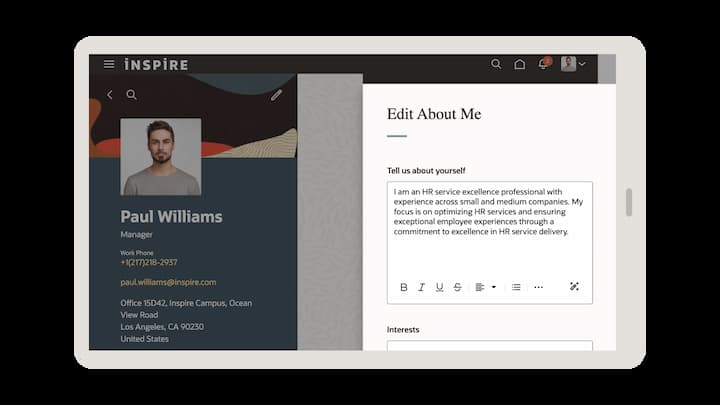Oracle recently announced that it will embed generative AI capabilities into its Fusion Cloud Human Capital Management (HCM) system. Given the system’s extensive user base, including thousands of organizations, the integration of generative AI within client HR functions is expected to bring about a significant shift in the HCM landscape.
The evolution will happen within existing processes, with Oracle promising the move will help clients trim busy work and improve employee and candidate experience—a growing focus in the challenging labor market.
Key features include assisted authoring that drafts content based on user-provided prompts, content suggestions that reflect the organization’s language style and summarization of vital content to ease information consumption. Oracle’s announcement follows increasing efforts in the HR industry to take advantage of new artificial intelligence tools—creating new opportunities for HR to contemplate how to balance the skills of their team with tools on the market.
AI technology with a low barrier to entry
During a recent Mercer | Leapgen webinar, THE BIG SHIFT: HR Tech is Now Work Tech, Jason Averbook, senior partner and global leader of digital HR strategy at the organization, pointed out ease of use, wide accessibility and integration abilities are the hooks that can skyrocket a new slice of technology into high adoption. Averbook says that AI tools like ChatGPT, which reached 100 million monthly users in a short two months, must be highly “consumable” to gain rapid adoption.
This is what Oracle hopes to do for its clients, describing its new addition as a “personal assistant” that will ease the burden of routine and repetitive tasks and fit into the workday seamlessly—ultimately freeing up HR professionals’ time and energy, and delivering productivity that drops to the bottom line.
“Generative AI is boosting productivity and unlocking a new world of skills, ideas and creativity that can have an immediate impact in the workplace,” said Chris Leone, executive vice president of applications development, Oracle Cloud HCM.

Automating routine tasks and simplifying complexity are just two immediate benefits of incorporating AI technology into HR functions, adds Guy Waterman, vice president of people analytics and human capital management technology and innovation at Oracle.
He describes a situation where an overwhelmed hiring manager delays the creation of a job requisition, thus delaying the productivity of the HR team. In this example, generative AI can populate the requisition based on the organization and manager’s hiring goal. It gives the manager content to adapt, rather than asking them to compose the requisition fully.

With the Fusion Cloud HCM addition, Waterman told HRE, there is no entry barrier because AI will be integrated into the systems that users trust and understand, allowing them to feel in control.
According to Leone, customers drive approximately 80% of Oracle’s product updates, and new use cases for AI integration will continue to evolve based on the needs of the clients who use them.
Waterman says Oracle will evolve the tool to work on more complex issues that will help CHROs and HR line of business managers “bring together a lot of really cool automation … with this generative AI capability and do so in a manner that they feel comfortable sharing it with their teams,” he says.
HR teams and managers can give employees access to the Fusion Cloud tools at appropriate levels, and AI assistant features can be turned on and off in a matter of clicks, Waterman adds.
See also: PwC’s HR, tech leaders prepare to train U.S. workforce on ChatGPT technology
HR leads AI change management
Waterman notes that the excitement around this release is palpable. “People want to try it. I think that if they try it, it’s one of those breakthrough technology moments,” he says.
Jack Berkowitz, chief data officer at ADP, considers AI a “step change” that will impact how people use the systems that power their workplaces. He insists these features must instill a sense of environmental control, not fear.
“What’s the change management for human resources? Getting people to use it,” he says. Allowing people to define goals up front, and then following up with AI to help create content and reduce mundane tasks, fosters a co-pilot concept that puts control in the hands of people, not machines.
As companywide systems take advantage of AI tools like the new release from Oracle, HR finds itself at the center of managing this change. While many organizations are navigating how to embrace this technology, CHROs essentially realize that what they’re doing is promoting transformation within their own teams and leadership units.
“The more effectively that we can market to our own people, make them want to be part of this bigger team, our common mission, we are creating that corporate culture,” Waterman says. “We’re looking for ways to do that; we’re just using automation to enable it.”
The post What Oracle’s new AI-powered ‘personal assistant’ means for the market appeared first on HR Executive.